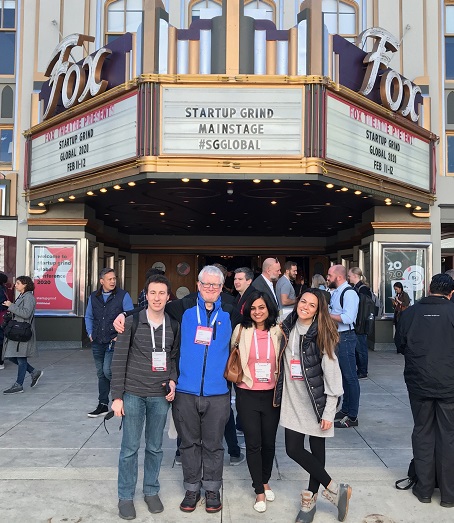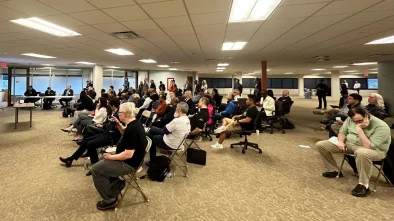Stengle Offers Advice on Fundraising to Founders at Startup Grind Princeton
At a recent Startup Grind Princeton workshop, David Stengle the group’s organizer, gave some down-to-earth advice to founders raising their first rounds.
His presentation covered topics that typically come up after founders decide that they need outside investment for their businesses to succeed. “And maybe you don’t have a bunch of golf buddies who run VC firms. How do you get to those people to get money?” he asked.
Stengle, who is a serial entrepreneur, is founder and CEO of Princeton-based Board++, a startup that breaks glass ceilings, diversifies startup boards and develops the next generation of leaders by placing corporate executives from underrepresented groups on startup boards.
Raising Money Is a Time Sink
The first thing founders should know is that raising money is a real time sink, so they should make sure they are raising a realistic amount.
“You might not know exactly how much you need, but a little too much is better than a little too little,” Stengle said. Determining how much you need involves projecting your sales leads for a year, and then adding a contingency of 30 percent.
“You can pretty much expect that, at the beginning of your journey, your plan won’t survive contact with the business world.” Something will change, such as market conditions or the competition, he said.
While a year is the minimum amount of time founders should plan for, 18 months is more realistic, he said, as the fund-raising process itself takes six months to a year.
Be Precise about How Much Money You Need
Be precise about what you need. Don’t go to an investor and say that you need between $5 million and $10 million. “What drugs are you on that you don’t know whether its $5 million or $10 million?” Stengle asked. “You should have a clear understanding of the use of the proceeds.”
Typically, founders raising their first rounds have several assumptions that, if true, mean that their businesses will be profitable. They are testing and validating those assumptions by saying, “These are the customers that will buy the product. This is my customer-acquisition cost. This is my average close time. This is how long it’s going to take me to crack a particular market. This is how long it will take me to build this channel relationship.”
Founders should be able to articulate the objectives they’re seeking to accomplish. They should be able to say, “Here’s the capital required for each one. Here is the time required for each one. And that should be tight,” Stengle said.
Tell People about Your Business and Solicit Feedback
A big mistake founders make is thinking that their idea is so special that they can’t tell anyone about it. Almost every successful startup has ideas that are refined through interactions and vigorous exchanges with colleagues and investors. And, “You should pretty much expect that any investor you show your idea to has seen a bunch of other companies pitch a similar idea.”
Tell people about your idea. Let them poke holes in it. Let them ask you why anyone would pay that price for it, why this or that competitor isn’t serving that market already, or what makes you think your build schedule is realistic. This will help you build a stronger, more resilient business, he said.
What’s vital to the investor is that the problem be an important problem, Stengle noted. “If you understand an important problem in the world, you can build a business around it. And if the technology changes, or the regulatory field changes, or economic conditions change, and you’re still attacking the problem, and that problem is still causing pain for a major market, your solution will be harder to displace.”
Marshal Outside Resources to Validate the Business
Stengle urged the founders in the audience to be creative when they look for people to sit on their boards or serve as advisers. “You want people that are going to contribute to the caliber of your ideas, and you can really get someone that is credible and can open their networks and their access.” The advisers and board members you select should be “able to engage with people that are important in the space, as powerful validation.”
Never Ask an Investor to Sign an NDA
During the talk, Stengle warned the founders never to ask investors to sign nondisclosure agreements. Several founders in the audience expressed concern about this, thinking that they’d give away their competitive advantage, but Stengle stood pat. VCs don’t want to run businesses and don’t have the expertise to do so, so they won’t steal the secret sauce, he said. He added that before founders talk to any angel or VC, they should make sure that the angel or VC doesn’t have a direct competitor in his or her portfolio. But, in general, asking a VC or angel to sign an NDA indicates that you “don’t really get venture,” he said. “That hurts you because a big part of venture financing is that it’s a club, and you want to understand the rules of the club, and the jargon of the club and the expectations of the club as you approach that community.”




